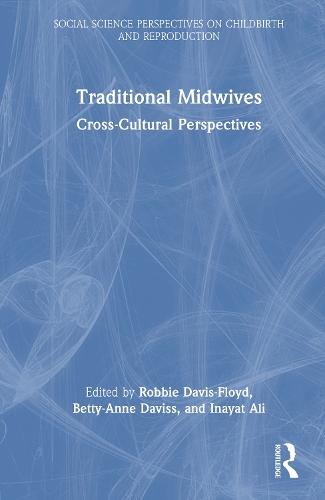|
Overview
Full Product Details
Author: Robbie Davis-Floyd (Rice University) , Betty-Anne Daviss , Inayat Ali (Fatima Jinnah Women University, Rawalpindi, Pakistan)
Publisher: Taylor & Francis Ltd
Imprint: Routledge
Weight: 1.060kg
ISBN: 9781032461229
ISBN 10: 1032461225
Pages: 468
Publication Date: 30 October 2025
Audience:
College/higher education
,
Professional and scholarly
,
Tertiary & Higher Education
,
Professional & Vocational
Format: Hardback
Publisher's Status: Active
Availability: Not yet available 
This item is yet to be released. You can pre-order this item and we will dispatch it to you upon its release.
Table of Contents
Introduction: Cross-Cultural Perspectives on Traditional Midwives Robbie Davis-Floyd, Betty-Anne Daviss, and Inayat Ali 1. Authoritative Knowledge: A Trialogue on Ways of Doing, Teaching, and Learning About Birth Melissa Cheyney, Robbie Davis-Floyd, and Brigitte Jordan (posthumously) Part 1. Traditional Midwives In Mexico: In Homage To Brigitte Jordan, Founding Mother Of The Anthropologies Of Midwifery And Birth 2. Regulating Traditional Mexican Midwifery: Practices of Control, Strategies of Resistance Mounia El Kotni 3. Integrating Traditional Midwives into the State Healthcare System: A Critical Case Study from Chiapas, Mexico Margaret Buckner, Mariana Montaño, and Iris Vanegas 4. Community Power as the Source for Valuing and Validating Traditional Midwifery in Mexico Nancy Paola Chávez Arias 5. A Tale of Three Midwives: Inconsistent Policies and the Marginalization of Midwifery in Mexico Lydia Dixon, Mounia El Kotni, and Veronica Miranda 6. Two Traditional Midwives in Mexico: Re-Turning to the Essence of Traditional Midwifery Sabrina Speich Part 2. Traditional Midwives In Nigeria, Kenya, Tanzania, Uganda, Aotearoa New Zealand, Pakistan, Laos, Peru, Norway, Guatemala, And India 7. Traditional Midwives in Nigeria, the Importance of Their Work, How They Are Perceived by Biomedical Maternity Care Professionals and Mothers, and How Traditional Midwives Perceive Biomedical Maternity Care Practitioners Andrew Donatus Abue 8. The Roles of Traditional Midwives during Healthcare Crises in Kenya: Experiences from the Giriama Community in Coastal Kenya Stephen Okumu Ombere 9. Traditional Birth Escorts? Reexamining the Work and Needs of Traditional Midwives in Rural Tanzania Megan Cogburn 10. Indigenous Midwives and the Biomedical System among the Karamojong of Uganda: Introducing the Partnership Paradigm Sally Graham and Robbie Davis-Floyd 11. Cradling the Renaissance of Ngāi Tahu Customary Maternity Knowledge through Ancient Lullabies Kelly Tikao 12. Traditional Midwives and Home Births in Rural Sindh Province, Pakistan: Exploring Maternal Healthcare Practices and Preferences Salma Sadique, Inayat Ali, and Shahbaz Ali 13. Baloch Midwives in Pakistan Challenge the Haunting Expectations of Hospital Births Fouzieyha Towghi 14.When the Traditional Midwife Is a Man: Reimagining Traditional Midwifery in Laos and Globally Pascale Hancart Petitet 15. The Afterlife of Andean Parteras: The Provision of “Shadow Reproductive Care” and the Ironies of Expertise Rebecca Irons 16. Standing with Ancestral Authority in Guatemala: Comadronas’ Tireless Historical Services Win Partial Redemption Luisa Araneda, Ingrid González, Betty-Anne Daviss, translation by Fernando Rodríguez 17. Sámi Midwifery in Times of Transition Ánne-Hedvig Salmi Nordsletta and Anna-Lill Drugge 18. Traces of the Traditional: The Emergence of Professional Midwifery Practices in Contemporary India Sreya Majumdar Conclusions Robbie Davis-Floyd, Betty-Anne Daviss, and Inayat Ali
Reviews
Author Information
Robbie Davis-Floyd PhD, Adjunct Professor, Dept. of Anthropology, Rice University is a well- known cultural/medical/reproductive anthropologist, and an international speaker and researcher in transformational models of childbirth, midwifery, obstetrics, and reproduction. Betty- Anne Daviss MA, BMJ, RM is a Canadian registered midwife who, for almost 50 years, has combined her midwifery practice with her research in the social sciences and in clinical epidemiology. Inayat Ali PhD is an Assistant Professor in the Department of Anthropology, Fatima Jinnah Women University, Rawalpindi, Pakistan, a Pakistani medical anthropologist, and a public health expert.
Tab Content 6
Author Website:
Countries Available
All regions
|



